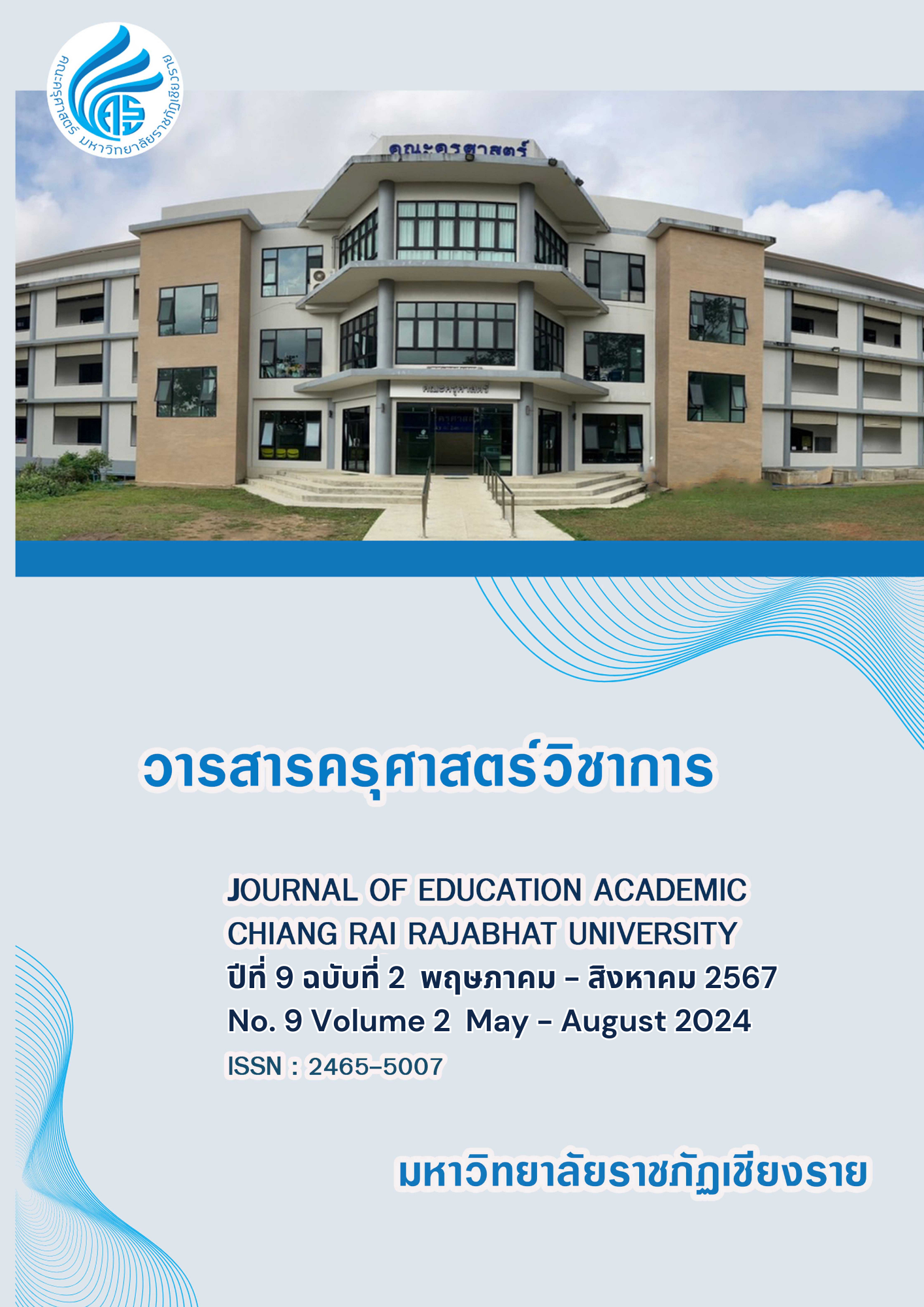The Development of Critical Thinking Skills and Learning Achievement in Social Studies of Seventh Grade Students Using Active Learning Concept; Case-based Learning with Questioning Techniques
Keywords:
Critical Thinking Skills, Social Studies, Active Learning, Case-Based Learning, Questioning TechniquesAbstract
This research is an experimental research. The purposes of this study were to 1) to develop students’ critical thinking skills after learning with active learning concept; case-based learning with questioning techniques compared with 70 percent criteria. 2) to compare the social studies learning achievement of students who learned with active learning concept; case-based learning with questioning techniques before and after the learning management 3) to study students' opinions on learning management according to active learning concept using case-based learning with questioning techniques. The sample for this research consisted of 32 seventh grade students who studied in the second semester of the academic year 2023 from Piboonbumpen Demonstration School, Burapha University using cluster random sampling. The research instruments were 1) Lesson plans 2) Learning achievement test 3) Critical thinking skills test 4) Questionnaire. The statistics employed for data analysis were the mean, standard deviation and t-test.
The research findings showed that: 1) Students’ critical thinking skills after using active learning concept was higher than 70 percent criteria with statistically significant at .05 level. 2) The social studies learning achievement of students after using active learning concept was higher than before learning with statistically significant at .05 level. 3) Students’ opinions about using active learning concept were at a high level.
References
กระทรวงศึกษาธิการ. (2551). หลักสูตรแกนกลางการศึกษาขั้นพื้นฐาน พุทธศักราช 2551. กรุงเทพฯ: โรงพิมพ์ชุมนุมสหกรณ์การเกษตรแห่งประเทศไทย.
เกรียงศักดิ์ เจริญวงศ์ศักดิ์. (2543). ปั้นสมองของชาติ: ยุทธศาสตร์ปฏิรูปการศึกษา. กรุงเทพฯ: ซัคเซสมีเดีย.
เกียรติพร สินพิบูลย์. (2560). การพัฒนาความสามารถการคิดอย่างมีวิจารณญาณด้วยการใช้คำถามเป็นฐานร่วมกับมัลติมีเดียสำหรับนักเรียนชั้นมัธยมศึกษาปีที่ 6. วิทยานิพนธ์ศึกษาศาสตร์มหาบัณฑิต. มหาวิทยาลัยศิลปากร.
ชัยวัฒน์ สุทธิรัตน์. (2567). Active Learning: มโนทัศน์ วิธีการ และเทคนิค. พิษณุโลก: โรงพิมพ์รัตนสุวรรณการพิมพ์.
ดนุชา สลีวงศ์, ปราวีณยา สุวรรณณัฐโชติ และสุพัตรา คูหากาญจน์. (2558). การพัฒนาการคิดวิจารณญาณด้วย การเรียนแบบกรณีศึกษาบนเว็บที่ใช้เทคนิคการตั้งคำถามและการคิดสะท้อน. วารสารบัณฑิตศึกษามหาวิทยาลัยราชภัฏวไลยอลงกรณ์ในพระบรมราชูปถัมภ์, 9(3), 197-208.
พิมพันธ์ เดชะคุปต์ และพเยาว์ ยินดีสุข. (2561). การเรียนรู้เชิงรุกแบบรวมพลังกับ PLC เพื่อการพัฒนา. กรุงเทพฯ : โรงพิมพ์แห่งจุฬาลงกรณ์มหาวิทยาลัย.
มนสิช สิทธิสมบูรณ์. (2565). กลยุทธ์การจัดการเรียนรู้เชิงรุก. พระนครศรีอยุธยา: โรงพิมพ์มหาจุฬาลงกรณ์ราชวิทยาลัย.
สุกัญญา ตันสุวรรณ, ศุภลักษณ์ สัตย์เพริศพราย, กรัณย์พล วิวรรธมงคล และญดาภัค กิจทวี. (2566). การพัฒนากิจกรรมการเรียนรู้วิชาสังคมศึกษา ตามแนวคิดการเรียนรู้เชิงรุกร่วมกับเทคนิคการใช้คำถามเป็นฐานและการโค้ช เพื่อเสริมสร้างความเป็นพลเมืองของนักเรียนชั้นประถมศึกษาปีที่ 5. วารสารการพัฒนางานประจำสู่งานวิจัย มหาวิทยาลัยมหิดล, 10(1), 19-29.
สุธน วงศ์แดง. (2564). การพัฒนาการคิดอย่างมีวิจารณญาณสำหรับนักศึกษาครู มหาวิทยาลัยราชภัฏจันทรเกษม โดยใช้คำถามทรงพลัง. วารสารมหาวิทยาลัยราชภัฏร้อยเอ็ด, 16(2), 187-197.
สำนักงานเลขาธิการสภาการศึกษา. (2560). แผนการศึกษาแห่งชาติ พ.ศ. 2560-2579. กรุงเทพฯ: พริกหวานกราฟฟิค.
วรุตม์ อินทฤทธิ์ และวลัย อิศรางกูร ณ อยุธยา. (2559). ผลของการเรียนการสอนสังคมศึกษาโดยใช้วิธีกรณีศึกษาที่มีต่อมโนทัศน์ประชาธิปไตยและความสามารถในการคิดอย่างมีวิจารณญาณของนักเรียนมัธยมศึกษาตอนปลาย. วารสารอิเล็กทรอนิกส์ทางการศึกษา (OJED) จุฬาลงกรณ์มหาวิทยาลัย. 11(1), 187-200.
วลัย อิศรางกูร ณ อยุธยา. (2555). ครูสังคมศึกษากับการพัฒนาทักษะแก่นักเรียน. กรุงเทพฯ : โรงพิมพ์แห่งจุฬาลงกรณ์มหาวิทยาลัย.
วัชรา เล่าเรียนดี. (2553). รูปแบบและกลยุทธ์การจัดการเรียนรู้เพื่อพัฒนาทักษะการคิด. นครปฐม: โรงพิมพ์มหาวิทยาลัยศิลปากร วิทยาเขตพระราชวังสนามจันทร์.
Cambridge Assessment International Education. (2022). Getting Started with Active Learning. Retrieved from https://www. cambridge-community.org.uk/professional-development/gswal/index.htm.
Donovan, M.S. & Bransford, J.D. (2005). How students learn science in the classroom. Washington DC: National Academy Press.
Ennis, R. H. (2013). The nature of critical thinking: An outline of critical thinking dispositions and abilities. Retrieved from https://www.critical thinking.net
Esteban, A. A. (2022). Case study teaching in social studies: Student satisfaction survey. International Journal of Social Studies Education, 7(2), 28-39.
McKinney, K. & Heyl, B. (2008). Sociology Through Active Learning. 2nd ed. Thousand Oaks, CA: SAGE/Pine Forge Press.
Mahdi, Q.R., Nassar, I.A. & Almuslamani, H.A.I. (2020). The Role of Using Case Studies Method in Improving Students' Critical Thinking Skills in Higher Education. International Journal of Higher Education. 9(2) p297-308. Retrieved from https://eric.ed.gov/?id=EJ1248562.
Syaikhudin, Ahmad. (2016). Fostering Student Critical Thinking Skills in Elementary Social Studies Using Socrates Question Method (SQM). The 1st International Conference on Child-Friendly Education (ICCE). Retrieved from https://publikasiilmiah.ums.ac.id/xmlui/handle/11617/7239.
Downloads
Published
Issue
Section
License
Copyright (c) 2024 Journal of Education Academic Chiang Rai Rajabhat University

This work is licensed under a Creative Commons Attribution-NonCommercial-NoDerivatives 4.0 International License.






